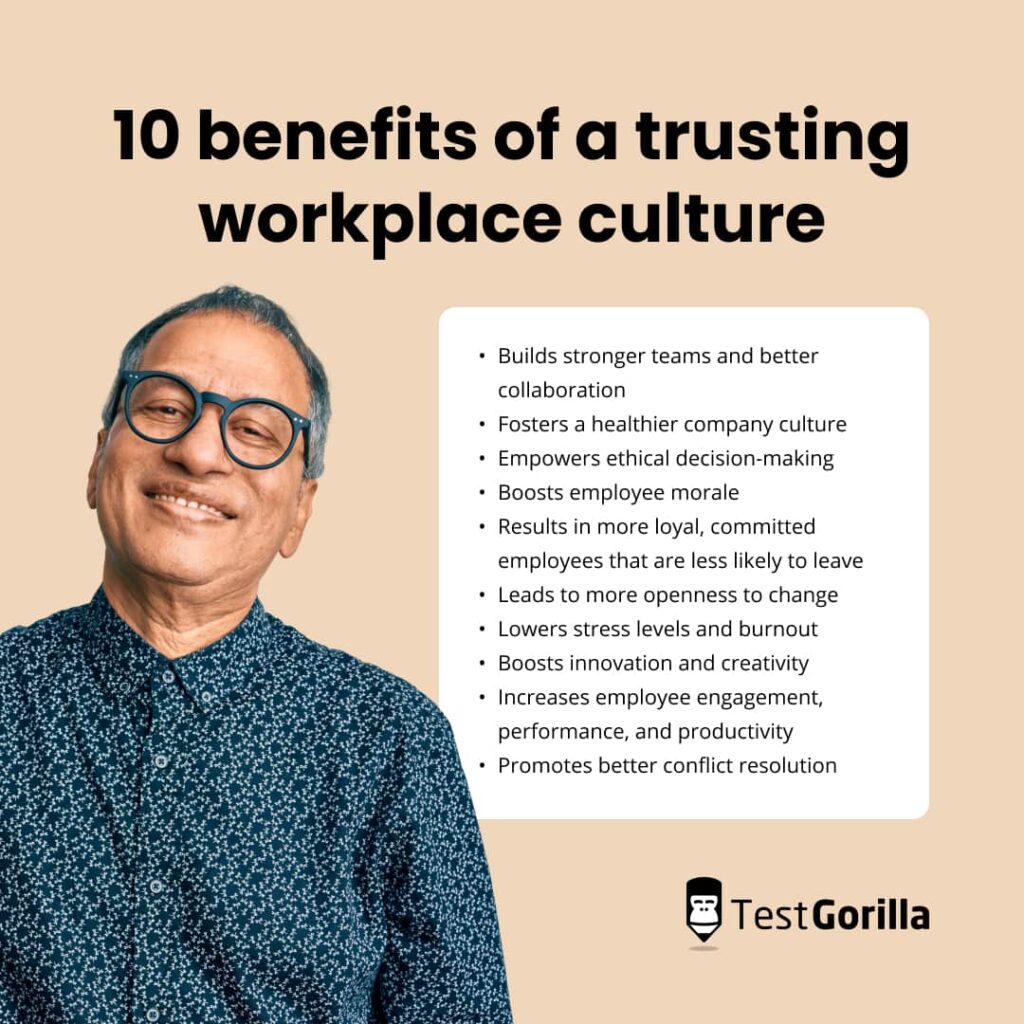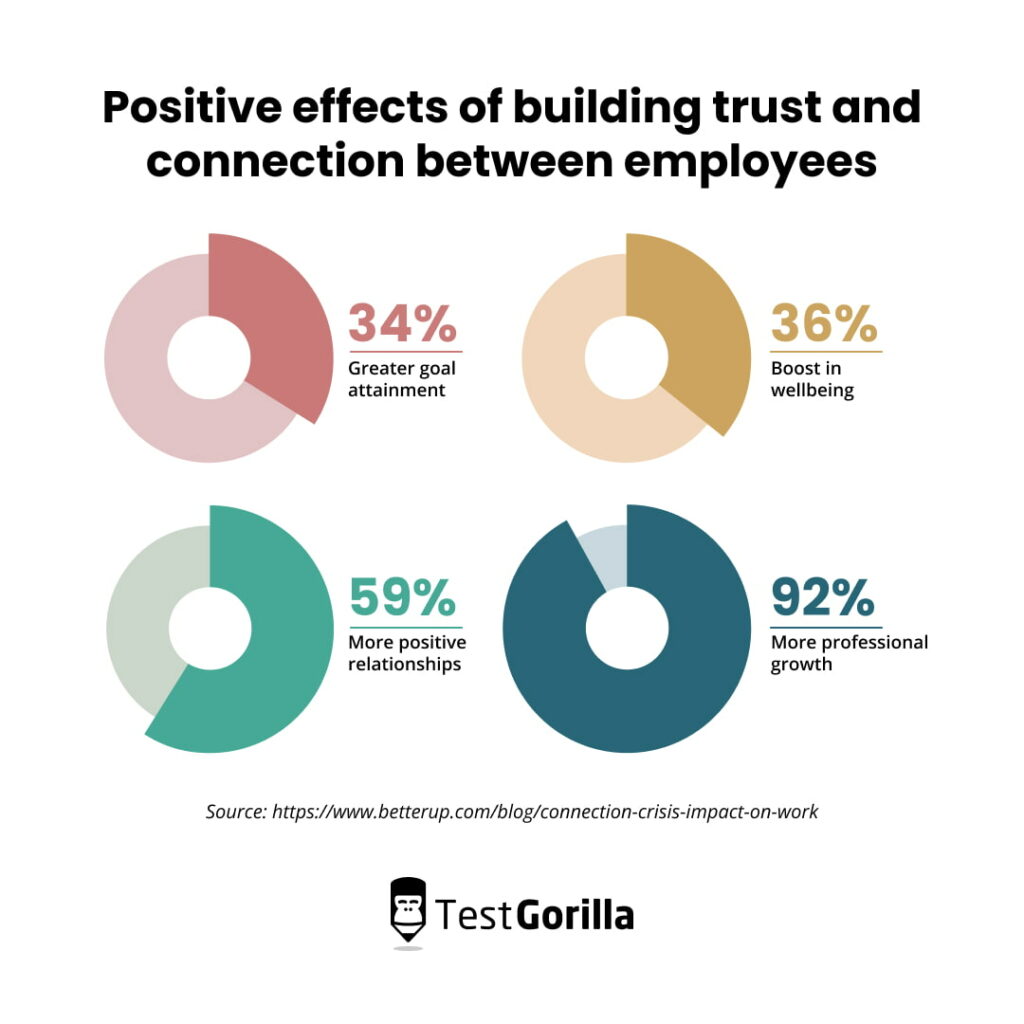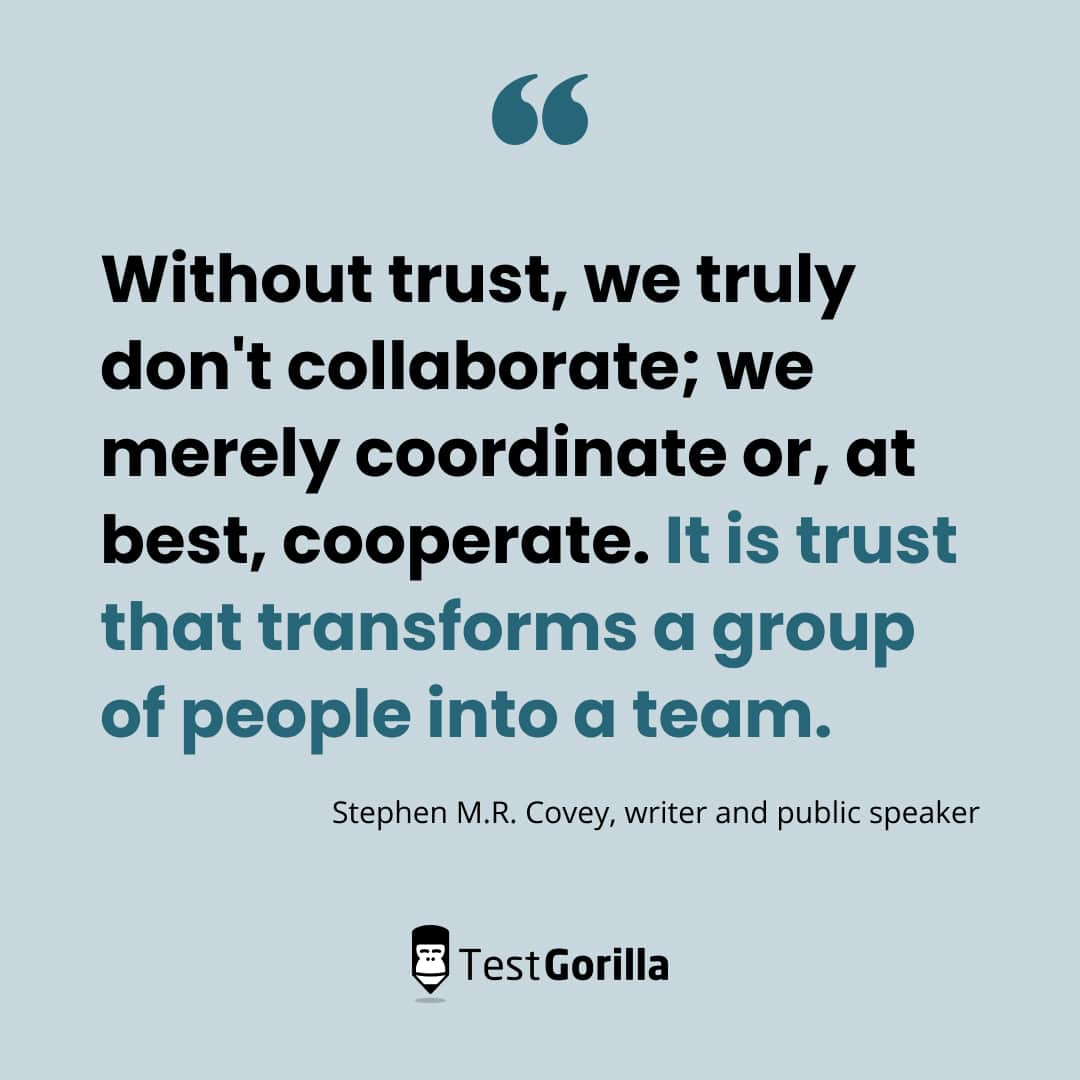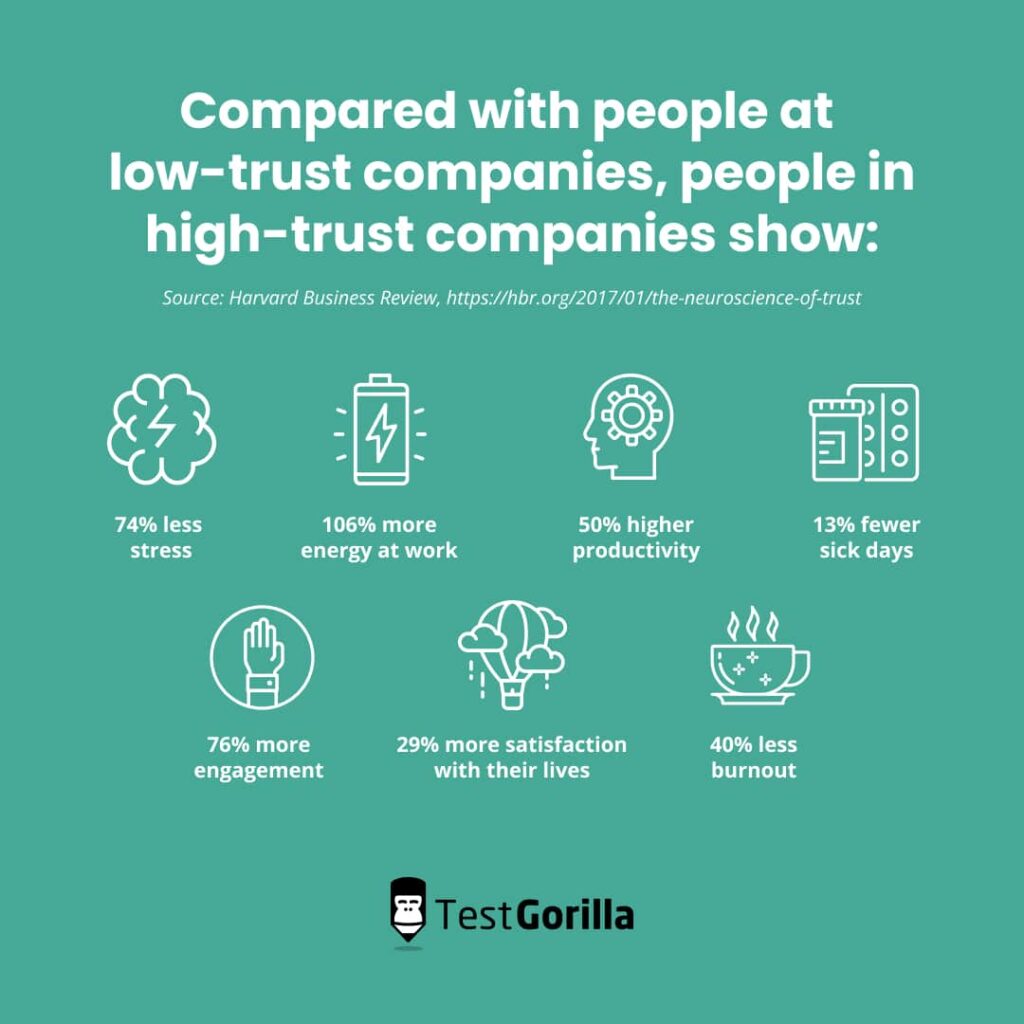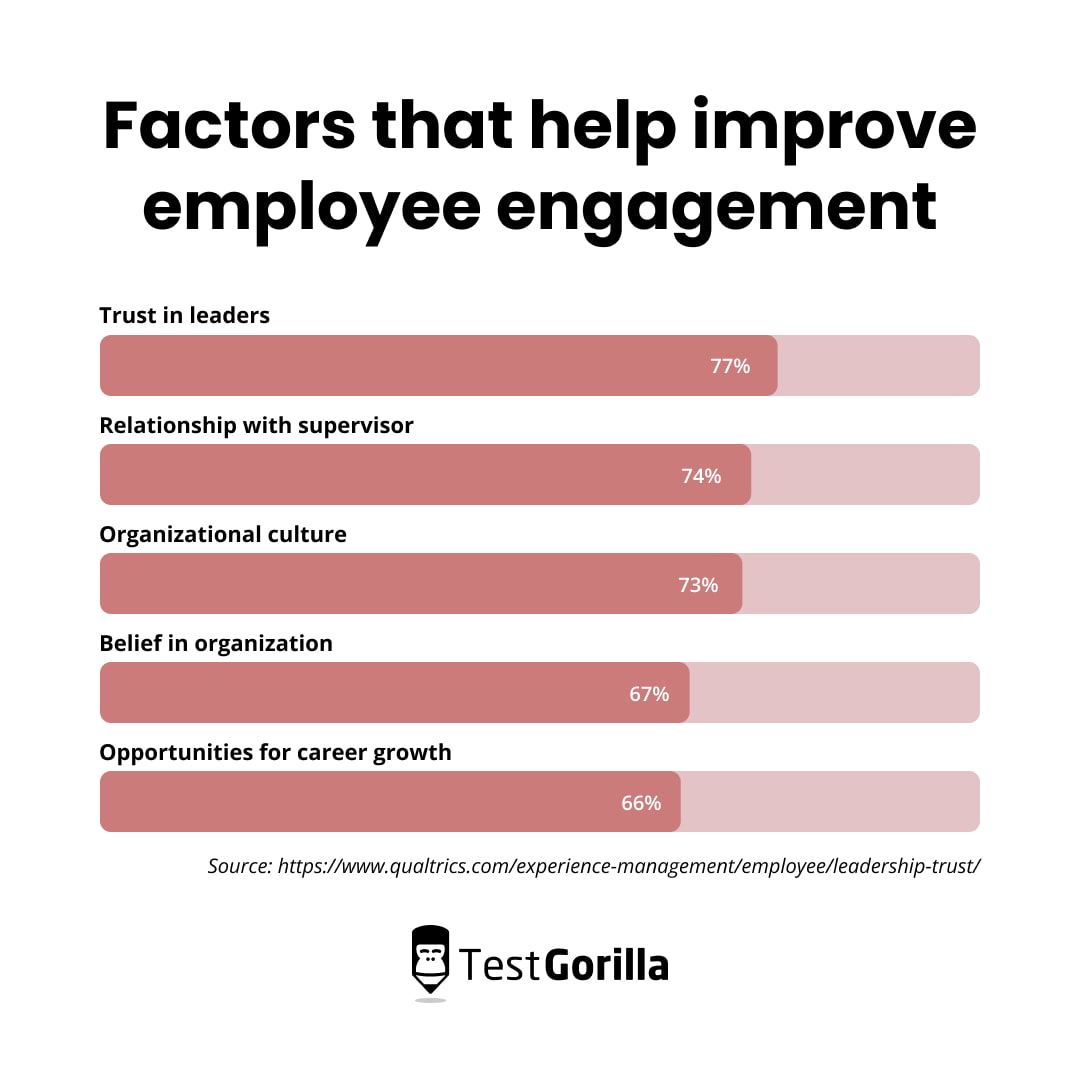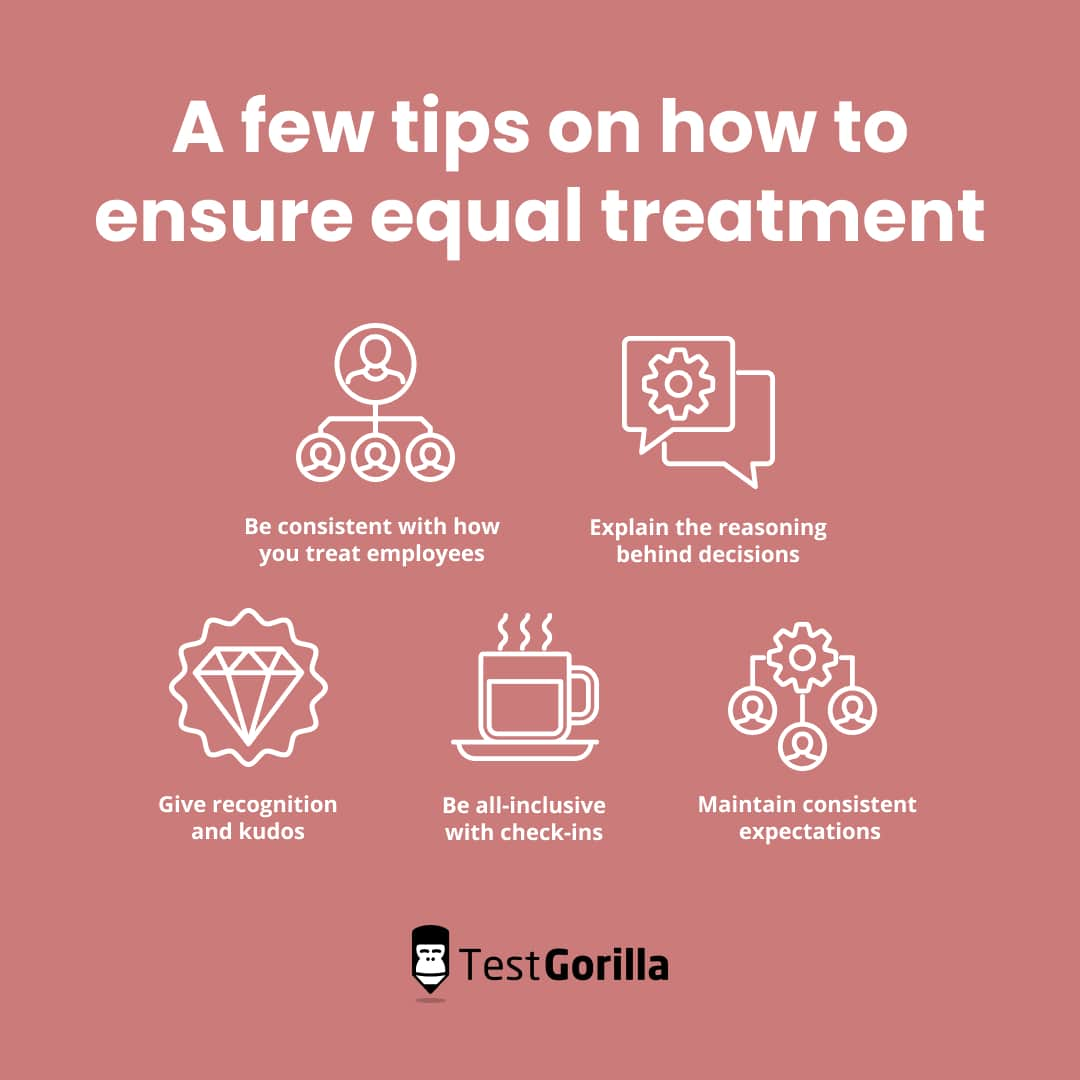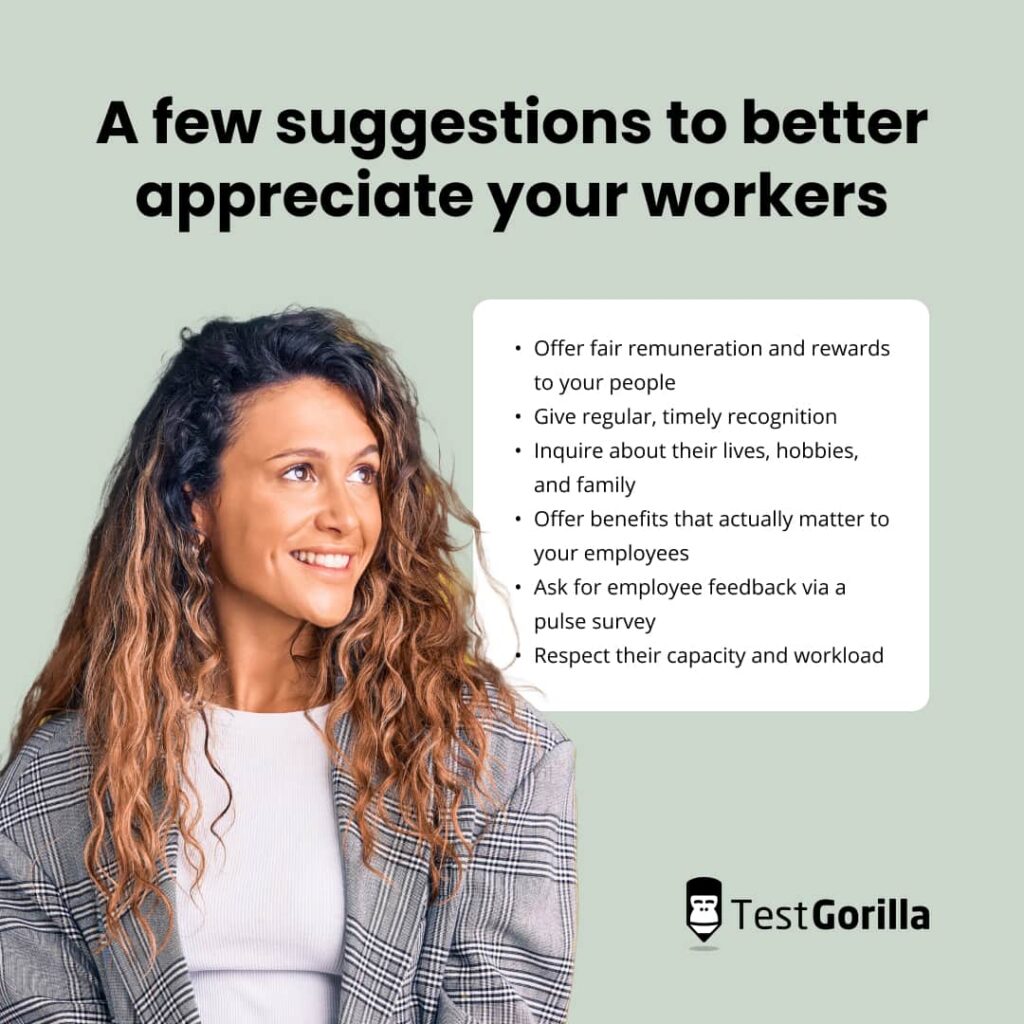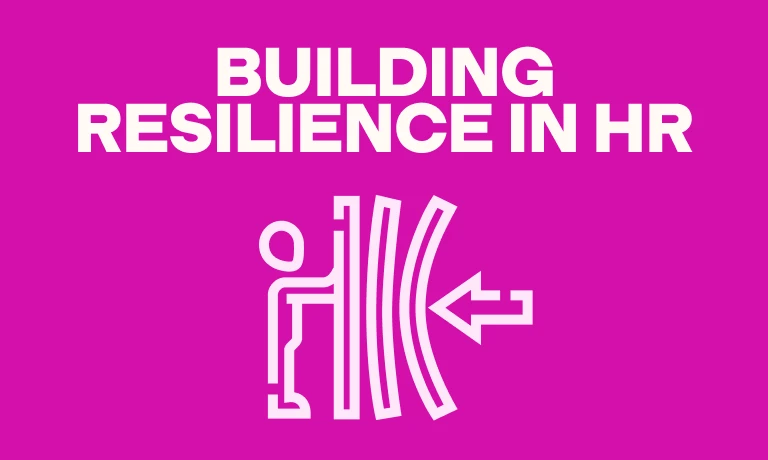Why is trust important in the workplace? Plus 7 ways to build it!
Workplace trust is a feeling of security, transparency, and respect among employees and senior leaders.
Why is trust important in the workplace? It builds a culture of reliability, healthy communication, and better collaboration.
Let’s use Josie, a sales representative, as an example.
Josie’s firm is undergoing an organizational restructuring, and she’s just been informed that her role will change drastically.
Here are two possible outcomes:
In a low-trust company, Josie feels frustrated and helpless. She protests strongly, resists the change, and complains to her HR manager daily.
In a high-trust company, Josie retains a level of uncertainty but feels secure enough to rely on her employer. She knows she’s valued and respected and that the change will work out in the end.
Building trust in the workplace isn’t a bonus, it’s a non-negotiable.
This article discusses the many benefits of building workplace trust and the best practices you can adopt to nurture a culture of trust with your employees.
Why is trust important in the workplace?
Let’s get straight to the point and discuss the advantages of a trusting workplace culture.
The importance of trust in the workplace cannot be overstated. It positively impacts retention, collaboration, and performance.
Summary of the 10 benefits of a trusting workplace culture
Let’s first look at a quick summary of the benefits of trust in the workplace.
Benefit | Description |
Builds stronger teams and better collaboration | When team members trust each other, they collaborate and cooperate more effectively |
Fosters a healthier company culture | A company culture founded on trust creates a safe, healthy place where people want to work |
Empowers ethical decision-making | Trust encourages making better decisions informed by empathy |
Boosts employee morale | Certainty in your workplace and among colleagues increases motivation and improves the overall opinion of the company |
Results in more loyal, committed employees that are less likely to leave | Increasing trust is one of the top ways to reduce turnover and increase retention |
Leads to more openness to change | Change is more welcomed and accepted when employees trust their leaders and organization |
Lowers stress levels and burnout | High levels of trust help reduce stress and anxiety |
Boosts innovation and creativity | Team members are more likely to open up, share ideas, and create great things when they feel comfortable enough to speak freely |
Increases employee engagement, performance, and productivity | Overall performance, quality, and efficiency increase with a strong bond of trust |
Promotes better conflict resolution | Conflict can be quickly and effectively handled when all parties trust each other |
Builds stronger teams and better collaboration
You can’t have a strong team without a foundation of trust, but there’s an unfortunately low amount of trust among colleagues at most workplaces.
A One BetterUp study shows that:
38% of employees don’t trust coworkers
43% of employees don’t feel a sense of connection to coworkers
A far-too-high 53% of employees don’t look forward to going to work solely because of their coworkers
The same study shows the positive effects of building trust and connection between employees, as it:
Greater goal attainment (34%)
Boosts wellbeing (36%)
Increases positive work relationships (59%)
Improves professional growth (92%)
Stephen M.R. Covey, a writer and public speaker, once said:
“Without trust, we truly don’t collaborate; we merely coordinate or, at best, cooperate. It is trust that transforms a group of people into a team.” Source
Trust and reliance are important to nurture in every team, but it’s especially important for remote teams that rarely get opportunities to bond and grow with their teammates.
To read an in-depth guide on tips and strategies for remote teams, read our blog on remote work best practices.
Fosters a healthier company culture
When you build a culture of trust in the workplace, your actions have far-reaching positive outcomes.
A company built around trust will organically nurture a culture of:
Teamwork
Accountability
Transparency
Recognition
Humility
Reliability
Building a company culture based on natural trust and reliance will create a workplace that people want to be a part of. Positive work culture is the number one job satisfaction factor in all but one industry and one country.
Empowers ethical decision-making
A solid bond of trust encourages better decisions for employees and leaders.
When employees see the value of their contributions and decisions, they know they can make a real difference and that their choices and thoughts are meaningful.
This leads to them making more important, thoughtful decisions because they know they won’t simply be tossed away.
Trust affects leaders and managers, too. One study closely linked a leader’s likelihood to make more ethical decisions to how trusted they were by their people.
Boosts employee morale
When employees don’t trust leaders, leaders then don’t trust employees, and peers are uncertain of each other. It’s a recipe for disaster.
Lack of trust can quickly snowball into a negative, toxic work environment.
Micromanagement and overstepping work-life balance boundaries drastically reduce morale, motivation, and engagement. The same can be said about doing tasks that aren’t yours “just in case your colleague doesn’t do their job.”
Having confidence in your coworkers drastically improves employee morale, performance, and the overall opinion of the company they work for.
For more advice on how to improve morale, read our article on fun ways to boost morale at work.
Results in more loyal, committed employees that are less likely to leave
Why is trust important in the workplace? Because talented employees won’t work for a company they don’t trust. Sometimes, it’s the difference between having a trusting workforce and not having a workforce at all.
Upwork recently found that the recent surge of freelancers predominantly opted for contingent work because they would rather be their own bosses than work for their current leaders.
This means employees are striking out on their own purely because they don’t trust their leaders.
Simply put, employees feel insecure in a workplace with low trust and high uncertainty, so transparency creates a workplace that people want to work for.
Leads to more openness to change
Trust can be one of your most important resources during great upheavals, such as organizational restructuring.
When employees trust senior leadership and the company they work for, there’s substantially less opposition because they know they won’t be tossed aside or given the short end of the stick.
Trust through periods of great change is absolutely essential when trying to build a trauma-informed workplace, since employees who have suffered trauma can feel triggered by change.
Lowers stress levels and burnout
Employee burnout is a real problem, not a watercooler joke.
Burnout can cause exhaustion, depression, irritability, and absenteeism.
However, a stronger bond of trust alleviates and mitigates burnout by easing stress and improving employees’ well-being. According to the Harvard Business Review, compared with people at low-trust companies, people in high-trust companies show:
74% less stress
106% more energy at work
50% higher productivity
13% fewer sick days
76% more engagement
29% more satisfaction with their lives
40% less burnout
One of the biggest causes of stress and burnout is working for a company you don’t want to work for, so trust helps build a strong relationship between an employee and an organization.
Boosts innovation and creativity
Trust increases creativity.
Does that sound silly? If so, ask yourself if you’re most relaxed, creative, and open when you’re around people you don’t trust. Probably not, right?
High levels of trust enable employees to drop their guard, feel comfortable, and focus better on performance and quality.
Teams can also come up with better, more innovative ideas when they’re less guarded.
They can share knowledge and use their diverse perspectives to build something great rather than clamming up because they question the consequences of speaking freely.
Increases employee engagement, performance, and productivity
Employees are more focused, driven, and efficient when they trust the people around them.
Trust in senior leadership is the top driver for employee engagement, closely followed by a solid relationship with supervisors and a great organizational culture. You can improve the latter two by building trust in the workplace.
Employees produce higher quality work when they don’t feel guarded and uncertain. Think about the big-budget movies that come out nowadays. Which movies end up being of higher quality, the ones where the production team is said to have been under massive stress in crunch time or the ones where they were trusted to do things with the method and pace they were comfortable with?
Promotes better conflict resolution
It’s nearly impossible to resolve conflict if both parties don’t trust each other. Or if the mediator, often the human resources manager, doesn’t have a firm two-way trust with the employees in question.
People are more likely to cooperate, see their own mistakes, and take more accountability when they trust each other.
Workplace conflict can also damage the trust that’s already present, so a foundation of trust is needed to maintain relationships through difficulties.
Check out our blog post on workplace conflict to learn more about communication and conflict resolution.
How to build a culture of trust in the workplace
Building trust is essential to a healthy workplace, and we have tips and strategies to help it occur naturally.
Summary of the 7 ways to build trust in the workplace
Let’s take a look at our top ways to build trust in the workplace that you can start implementing today.
Strategy | Description |
Treat everyone equally | Equality and inclusivity lead to increased trust and respect |
Trust your people first | Leading from the top and trusting your workers helps them trust you back |
Appreciate your employees | Giving solid recognition and appreciation shows employees that you see the effort they put in |
Invest in your people’s training and development | The more thought you put into your people’s career growth, the stronger your bond |
Build a culture of honesty and transparency | Opening the door for honest conversation and encouraging feedback lets employees know you’re transparent and authentic |
Hire trusting and trustworthy candidates | Hiring trusting people will build your company on a foundation of reliance |
Opt for fair hiring practices | Showing your organization’s values before you even hire a candidate helps them trust you from the beginning |
Treat everyone equally
Employees take notice when treatment is unbalanced, which, in turn, leads to mistrust, jealousy, and disengagement.
It’s easy to let unconscious or accidental favoritism slip by, but it can be detrimental to building trust in the workplace.
Here are a few tips on how to ensure equal treatment:
Be consistent with how you treat employees
Explain the reasoning behind a decision if it seems biased
Give recognition and kudos to all workers
Be all-inclusive with check-ins and 1:1 meetings
Maintain consistent expectations of all workers
Increasing overall inclusivity also helps keep your workplace equal and balanced.
Take some time to look into equal pay and benefits, workplace diversity education, and better hiring accessibility and accommodations.
Accommodations are particularly important for neurodivergent and disabled employees. Providing visual instructions for people with ADHD or a quiet, secluded workspace for people with autism helps them perform at their best.
Promoting a culture of inclusivity and diversity doesn’t just show your team that they’re all equal and valued. It also boosts performance, creativity, and productivity.
Learn more about the benefits of diversity.
Trust your people first
It’s difficult – almost impossible – for employees to trust an organization that doesn’t trust them first.
Companies that doubt and scrutinize their workers obsessively and unnecessarily will see resentment and mistrust in return.
Trusting your employees means saying goodbye to:
Micromanaging: Nitpicking and being a helicopter manager make employees feel pressured, untrustworthy, and patronized.
Zero flexibility: Working hours and locations are becoming more flexible. Most employees nowadays demand autonomy, and others, like working parents and students, need it.
Policed time tracking: Big brother-style time tracking increases stress and burnout and makes employees feel controlled and erodes their sense of agency.
Monitored, dystopian time tracking destroys an employee’s trust in management – and it’s even been making the news.
The multinational bank Barclays made headlines with its obsessive time tracking. Their system tracked employee time and sent out messages to employees reprimanding them for being “inactive” and discouraging them from taking breaks.
An anonymous employee commented that they were afraid to step away from their desks, have full lunch breaks, take bathroom breaks, or even get up for water for fear of the repercussions.
Bar such poor practices from your workplace by:
Relaxing and trusting your employees with the little details
Offering a flexible working policy
Finding alternative methods for time tracking, such as tools like Toggl Track or Harvest
Building trust in the workplace starts at the top, and your employees will repay the trust you place in them.
Appreciate your employees
Employees want to be seen, appreciated, and recognized for their hard work.
Many workers prize recognition above monetary rewards like promotions and bonuses.
Simply giving employees a pat on the back and truly celebrating individual and team effort goes a long way in building trust in the workplace.
Here are a few suggestions to better appreciate your workers:
Offer fair remuneration and rewards to your people: Try offering employee incentives and spot awards.
Give regular, timely recognition: Build recognition into your routine and ensure it happens soon after the achievement to make the praise all the more valuable.
Inquire about their lives, hobbies, and family: Taking the time to ask about employees’ lives shows that they aren’t just a worker-bee or a drone to you. They’re human.
Offer benefits that actually matter to your employees: Make the effort to personalize benefits that mean something to your workers. If you’re unsure what they need, it’s as simple as asking them.
Ask for employee feedback via a pulse survey: Ask your employees their opinions with a weekly or monthly feedback survey. Implement the most thoughtful suggestions and let them know.
Respect their capacity and workload: Make sure employees aren’t overloaded and taking on too much work. How? Talk to them and review their schedules together.
These points go much further than trust – they boost morale, engagement, and performance. Employees need to feel recognized and respected, and showing them how much they’re worth will make them happy they work for you.
Invest in your people’s training and development
Your employees crave learning and development. It stimulates the brain and helps them get farther in their careers.
The 2022 LinkedIn Workplace Learning Report showed that companies that excel at internal mobility retain workers for twice as long and that employees who believe their skills aren’t being properly used are 10 times more likely to quit.
It also revealed an employee’s top three motivators for learning. Employees are eager to learn if:
It helps them stay up-to-date in their field
Learning and development initiatives are tailored to the their interests and objectives
It helps them with their career goals, such as get promoted internally or move to a different team or department
Employees want to learn so they can flourish in your organization. All you need to do is facilitate it.
Investing in your workers’ training, goals, and career growth also relays to them their worth and value to the company, increasing trust.
Too often, companies can seem like they’re trying to keep workers down. When an organization shows active consideration for learning and development, it builds a solid relationship that tells the employee, “We want you to succeed.”
Build a culture of honesty and transparency
Building trust and respect in the workplace is difficult when leaders shut employees out and maintain an air of “don’t talk to me” and “too busy for you.”
Transparency, honesty, and open communication are essential for nurturing employee trust.
Stuart Waddington, the founder of Star Development UK, says the three things leaders need to display to build strong trust are:
Authenticity
Logic
Empathy
This not only means the external factors of transparency, such as encouraging questions, giving employees open access to phone numbers and email addresses of senior leaders, and always welcoming feedback, but also personal transparency.
Personal transparency means being a leader who doesn’t make people guess what they’re thinking, their motives, and where they stand.
If your employees know where you stand, they know where they stand.
Hire trusting and trustworthy candidates
Hire the right people, and you can build your company on a foundation of trust.
Taking the time to recruit trusting, trustworthy employees ensures leaders can trust the employees – and vice versa – from day one.
So how can you find candidates with the soft skills and personalities that make them trustworthy employees? Give online skills testing a try.
Skills-testing software like TestGorilla enables hiring managers to assess a candidate’s soft skills, situational judgment, personality, and technical skills so that you can zero in on the applicant with the right job skills and attitude.
Here are a few tests that help determine trust levels:
Skills tests facilitate building a company on trust. At the same time, they reduce the unconscious bias associated with traditional hiring practices, thereby increasing diversity and inclusivity (which also boosts trust, as mentioned above).
Opt for fair hiring practices
Build and show trust from the very first interactions a person has with your company: the hiring stage.
Using fair hiring practices gets your relationship with new employees off on the right foot. They can see your beliefs, values, and stance before you onboard them, meaning they’ll start their first day with a base layer of trust.
Here are a things you can to do create a fair hiring process:
Reduce reliance on resumes and CVs
Eliminate unconscious bias
Focus on skills-based hiring
Follow “ban the box” hiring practices
“Ban the box” hiring practices, or fair chance hiring, sound similar to fair hiring practices but are a bit more specific.
Fair chance hiring is the practice of giving formerly imprisoned candidates an equal chance at getting a job and includes banning the “criminal record checkbox” to only conduct fair, relevant background checks.
Building trust in the workplace is essential for people with a criminal record. People who have been to prison have been through a lot and find it difficult to trust and rely on others.
Plus, unfortunate stigmas are associated with formerly imprisoned people, and other employees may have difficulty trusting them. If they’ve done time for whatever they may have been responsible for in the past, then they have the right to put that behind them entirely.
Welcoming new employees with fair hiring practices shows them you’re a considerate, forward-thinking company. It will establish day-one trust that will continue to grow through your ongoing relationship.
The best insights on HR and recruitment, delivered to your inbox.
Biweekly updates. No spam. Unsubscribe any time.
Why is trust important in the workplace? In conclusion: it builds a better company
Learning how to build trust in the workplace will repay your efforts tenfold.
You’ll see reduced turnover, increased engagement, and stronger teams.
Use a combination of our best practices, such as solid recognition, fair and equal treatment, and fair hiring with the help of online skills testing.
For an in-depth read on skills testing and fair hiring, check out our article on skills-based hiring.
Use our Culture Add test to assess if your next candidate would make a great addition to your trust-centered company culture.
Related posts
You've scrolled this far
Why not try TestGorilla for free, and see what happens when you put skills first.


